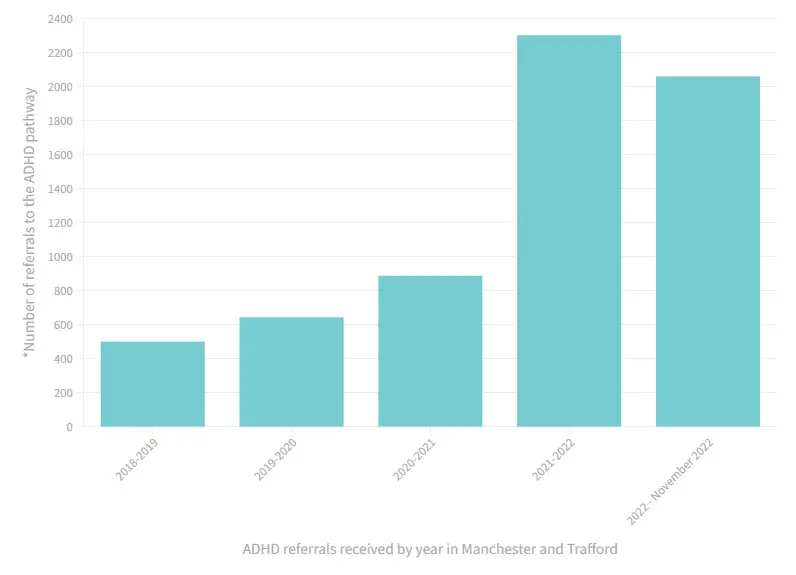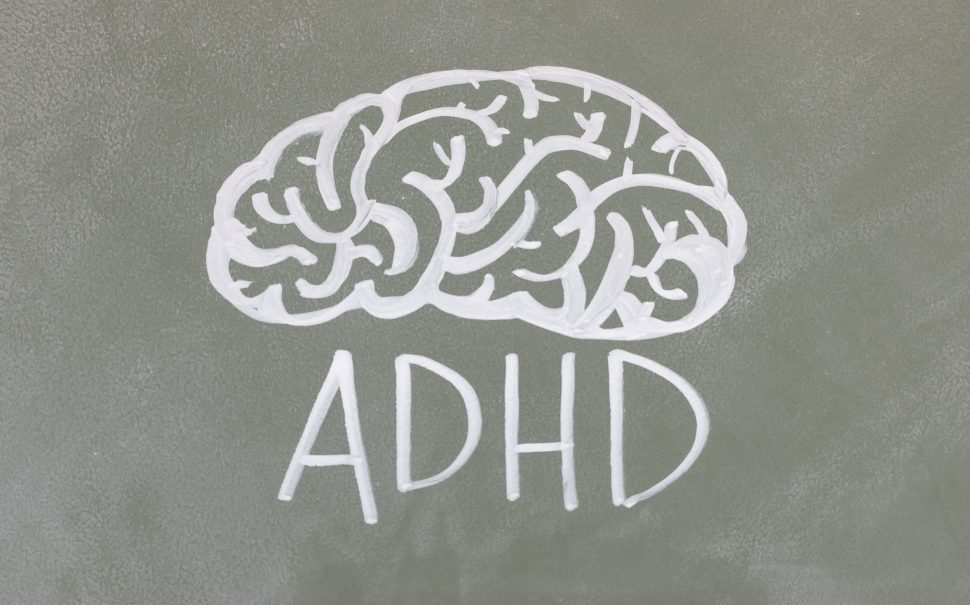Adults are waiting years for ADHD diagnoses in the UK due to NHS referrals for the condition soaring in recent years. Jenny Medlicott explores new data revealed about the rise in referrals in the Manchester and Trafford area...
Louise was 26 the first time she tried to get an ADHD diagnosis.
Now, 22 years on, she’s trying again.
“Getting to this point was a long process because I’ve been to my GP, but I’ve not been able to get an NHS diagnosis,” said Louise. “I first mentioned it 22 years ago, which gives you an indication of how difficult it is for women.”
Attention deficit hyperactivity disorder is a condition which can cause restlessness and affect a person’s impulses and concentration, amongst other things.
And now, new data obtained through the Freedom of Information Act shows the number of adults being referred for ADHD diagnosis in Manchester and Trafford has increased by 360% in just three years – a statistic which fits a similar pattern across the rest of the UK.
So why is this number suddenly on the rise?
It turns out this is a relatively new condition in the British medical field. Children couldn’t be diagnosed with it in the UK until 2000 and adults until 2008, meaning an entire generation missed out on a diagnosis.
But thanks to social media platforms like TikTok, more people than ever are talking about the signs of ADHD. In particular, how these signs can present differently in girls and adults – two groups which have historically gone underdiagnosed.
Such conversations have resulted in a huge number of people realising they have ADHD at a similar time, leading to a huge rise in referrals.
For Louise – and hundreds of others in a similar position – this increase means they are struggling to get a diagnosis.
“I first mentioned it 22 years ago. I mean, it was a while ago and they didn’t know anything then, but that’s how long I’ve known I have ADHD and I’ve still not got my diagnosis,” she said.
The first time Louise – not her real name – approached the NHS about a diagnosis, she was dismissed because her symptoms didn’t align with what they understood about the condition at the time.
Delays in the medical recognition of it means scores of adults today are living with it undiagnosed.
In the 22 years which have passed since she first sought a diagnosis, conversations and information around the condition have developed – but unfortunately the NHS’s capacity to deliver on diagnoses is falling behind.

Aware of the potential long wait ahead, Louise decided to pursue a diagnosis again, but this time privately.
She hoped going through a private clinic would streamline the process she’s already been waiting more than 20 years to go through.
But even after going through two private clinics, months later she’s still without an official diagnosis.
So how are people supposed to navigate a diagnosis on the NHS if even the private sector is lagging?
Henry Shelford, the CEO and co-founder of ADHD UK, attributes the rise in referrals to the fact more people are discussion the condition.
“People are talking about ADHD, and when people talk about it, people who have ADHD recognise it in themselves,” he said.
“There’s conversations on social media and TikTok, and we’re seeing some brave celebrities coming out and talking about ADHD and that’s a really wonderful thing. It’s chipping away at the stigma and discrimination and that’s fantastic.”
Rebecca Ryder, also based in Manchester, started her ADHD journey in June of 2021 with the NHS.
She began to suspect in the summer of 2021 she might have ADHD after learning about the symptoms through work and social media.
“I was writing a lot about mental health conditions and then ADHD,” she said. “Then along with learning about it that way, I sort of recognised the symptoms I was seeing through social media.
“So I called my doctor in June 2021, and that was when I started the process.”
Having heard stories of NHS waiting list times for ADHD referrals, Rebecca braced herself for a long wait to receive a diagnosis.
“I thought it was going to be longer than it actually was because I’ve heard of people paying to go private because they would have had to wait a year.”
But just a month after beginning her diagnosis journey, Rebecca was offered her first telephone appointment due to a last-minute cancellation – an instance of luck that few people pursuing an ADHD diagnosis encounter.
However, despite the earlier-than-expected initial telephone consultation, Rebecca still didn’t receive her diagnosis until 11 months later.
“It was definitely a relief. It validated what I 99% sort of knew anyway,” Rebecca said. “Once you have that diagnosis you can apply for access to work support, which I did.”
“Then that was the impetus for me to then be able to speak to parents and loved ones and tell them about it once I’ve sort of made it official, because up until then I felt like I was in limbo.”
Some people diagnosed with ADHD find relief in medication. But others, such as Rebecca, find the diagnosis itself is enough. Often, being diagnosed is about more than access to medication.
“It completely blows your mind when you revisit everything you’ve ever gone through, like childhood and in school,” she said.
“In school there were things like around studying or deadlines that I would really struggle with and just drive myself insane, and that pressure was awful but once I knew and could put a reason to that it was absolutely great.”
Mr Shelford said: “Getting a diagnosis can be absolutely life-changing. It allows you to understand your world in a way you’ve not been able to do before.
“Without a diagnosis it’s like you’re in a maze with the lights off and you’re banging into things and people, and you’re not able to navigate it in the way you know you’re capable of. But the understanding of ADHD that comes with a diagnosis turns those lights on.
“And yes your maze remains much more complicated than it is for many others but at least now you can navigate it. And that’s the life-changing difference.”
But access to this life-changing diagnosis has become more challenging than ever.
People like Louise, who still hasn’t received her diagnosis, are being left in limbo as waiting lists continue to grow with no signs of slowing down – and it’s these people who will suffer as a result.
For people struggling with symptoms of ADHD without a diagnosis, ADHD UK recommends using the right to choose scheme to start the process, which can be found here.




